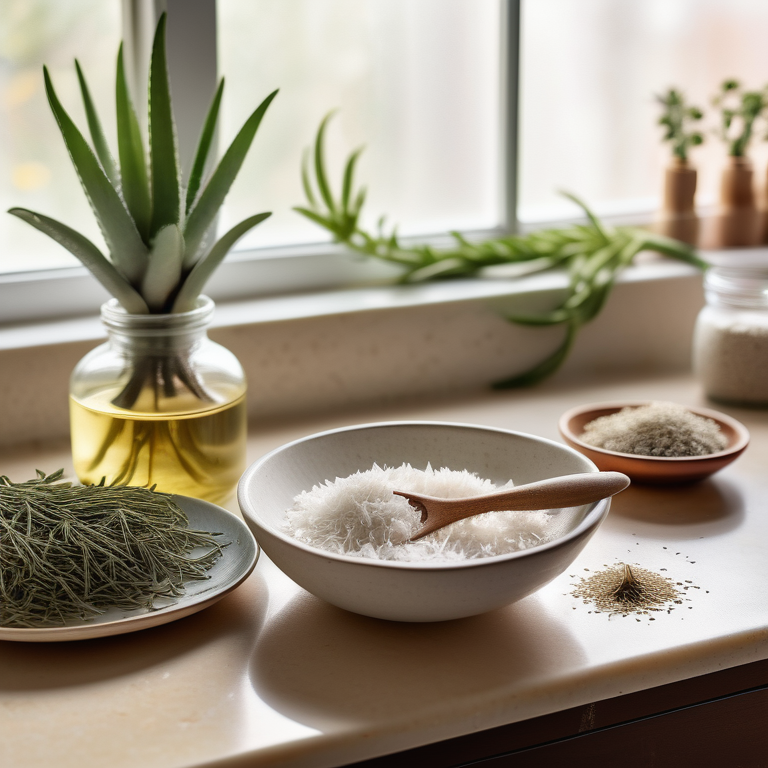Key Highlights
- Candida overgrowth occurs when there's an excess of Candida fungus in the body.
- Causes can include antibiotic use, a high-sugar diet, a weakened immune system, and hormonal imbalances.
- Symptoms of Candida overgrowth vary, ranging from digestive problems and skin rashes to fatigue and brain fog.
- Natural remedies can play a significant role in managing Candida at home.
- This blog explores those natural remedies and provides insights into preventing and combating Candida overgrowth.
Introduction
Candida overgrowth is a common issue that can lead to various uncomfortable symptoms. Many people want to try natural remedies instead of conventional treatments. This guide will help you understand, prevent, and manage candida overgrowth. You will find effective home remedies and lifestyle changes that could be helpful.
Understanding Candida Overgrowth
Candida albicans is a type of yeast that normally lives in the body. You can find it in the gut microbiome, the mouth, and on the skin. When everything is balanced, Candida helps with digestion and taking in nutrients. But if there is too much Candida, it can disrupt this balance. This leads to a problem called candidiasis or Candida overgrowth.
Many things can cause this overgrowth of Candida. These include a weak immune system, taking antibiotics, eating a lot of sugar and processed foods, hormonal changes, and some health issues.
Signs and Symptoms of Candida Overgrowth
Symptoms of a yeast infection can show up in different ways. This depends on where the overgrowth of Candida happens and how serious it is. For a vaginal yeast infection, you might feel itching, see redness, and notice white discharge in the vaginal area.
Oral thrush is another common symptom. It shows as white patches in the mouth and on the tongue. Besides these symptoms, Candida overgrowth can lead to bigger health issues. These can include digestive problems like bloating and gas, skin rashes, feeling very tired, brain fog, and mood swings.
It is important to remember that these symptoms can mean other problems as well. So, getting help from a doctor for a correct diagnosis and treatment is very important.
The Root Causes of Candida Overgrowth
Candida overgrowth is not usually a problem that stands alone. It often comes from other issues that upset the body's natural balance. To prevent and manage Candida overgrowth well, it's important to understand these main causes.
Many things can play a part, but some typical ones are using antibiotics, eating habits, and lifestyle choices.
Antibiotic Usage and Its Effects
Antibiotic use is sometimes needed, but it can disturb the balance of bacteria in the body. Antibiotics aim to kill harmful bacteria. However, they can also lower the good bacteria that keep Candida levels under control. This can cause too many bacteria to grow.
When good bacteria decrease, Candida can grow quickly. This may lead to higher Candida levels for those taking antibiotics.
To help with this, doctors often recommend eating foods rich in probiotics or taking supplements while using antibiotics. This can help restore a healthy balance of bacteria.
Diet and Lifestyle Factors
Diet is very important in either stopping or encouraging candida growth. Eating a lot of refined carbs, sugars, and processed foods can help Candida overgrow. These foods give Candida an easy source of energy, which helps it spread.
In contrast, a good diet with fiber, lean protein, vegetables, and healthy fats helps prevent Candida overgrowth. It’s also important to see how blood sugar changes affect Candida.
High blood sugar makes it easier for Candida to grow, leading to more problems. To manage candida overgrowth, it is essential to make changes that stabilize blood sugar. This can include regular exercise and a balanced diet.
Preventing Candida Overgrowth
To prevent Candida overgrowth, it's important to have a strong immune system and a healthy gut microbiome. Changing your diet and lifestyle can help keep this balance.
By making wise choices, you can lower the risk of Candida overgrowth and improve your overall health.
Importance of a Balanced Diet
A balanced diet is more than just counting calories. It’s about giving your body the right nutrients to keep your gut microbiome healthy. Eating different fruits, vegetables, and whole grains gives you important fiber. This fiber helps good bacteria in your gut, which is necessary for balanced microorganisms, including Candida.
Foods that are rich in probiotics, like yogurt with live cultures, kefir, sauerkraut, and kimchi, add more good bacteria to your gut. This helps create a place where Candida cannot grow too much. On the other hand, it's important to limit processed foods, sugary drinks, and refined carbs.
These types of food can upset the balance in your gut. They can let Candida grow more than it should. Choosing whole, unprocessed foods supports a healthy gut ecosystem. This way, Candida can be kept in check.
Lifestyle Changes to Reduce Risk
Beyond diet, making some lifestyle changes can help you fight against Candida overgrowth. Getting enough sleep is very important. Adults should aim for about 7-9 hours of sleep each night. Not getting enough sleep weakens your immune system. This makes you more vulnerable to infections, like Candida overgrowth.
Also, managing stress is vital. Long-term stress can upset your hormones. This can harm your immune response and raise the chances of Candida overgrowth. Doing activities that reduce stress, like yoga, meditation, or spending time outdoors, can help keep stress hormones low and support a healthy immune system.
Natural Remedies for Managing Candida at Home
Natural remedies provide a gentle and effective way to handle Candida at home. They focus on reducing Candida overgrowth while helping the body heal itself.
Using these natural remedies can be a strong method for bringing balance back and easing the discomfort connected to Candida overgrowth.
Probiotics and Gut Health
Probiotics are live microorganisms that can be good for your health, especially for your gut, when you eat enough of them. Some specific types of probiotics, like Lactobacillus acidophilus and Saccharomyces boulardii, are helpful for fighting Candida overgrowth.
Lactobacillus acidophilus is often found in fermented foods, such as yogurt and kefir. It makes lactic acid, which helps to create an acidic environment. This makes it harder for Candida to grow.
Saccharomyces boulardii is a helpful yeast. It works by pushing out Candida, which helps stop it from sticking to your gut and multiplying. Adding foods or supplements rich in probiotics to your meals can be a smart way to help keep your gut bacteria healthy and manage Candida overgrowth.
Coconut Oil and Its Antifungal Properties
Coconut oil is popular because it has many uses and possible health benefits. It has antifungal properties. This oil is full of medium-chain fatty acids, especially lauric acid. Lauric acid is strong against different fungi, including Candida.
Lauric acid breaks down the cell walls of Candida infections, which helps kill them. Studies show that coconut oil may help slow down the growth of Candida albicans. This type of Candida is the most common one linked to infections in people.
You can easily add coconut oil to your diet. Just mix a tablespoon into your morning smoothie or use it for cooking and baking. Also, if you have oral thrush, you can try oil pulling. Swish a tablespoon of coconut oil in your mouth for a few minutes to help lower Candida levels.
Garlic's Role in Fighting Candida
Garlic is important for fighting candida overgrowth safely. It has antifungal traits that target Candida albicans, which causes infections. You can eat garlic or apply it on your skin to treat different candida infections well. Garlic helps bring balance to the bacteria in your gut microbiome, stopping the growth of candida. It also supports the immune system, helping your body fight off repeated yeast infections. Adding garlic to your meals or skincare can be a good natural remedy for candida overgrowth.
Apple Cider Vinegar as a Natural Remedy
Apple cider vinegar comes from fermented apples. Many people believe it has health benefits. One of these benefits is its antifungal effect. The acid in apple cider vinegar may help stop Candida from growing.
Even though apple cider vinegar is usually safe, it's important to dilute it before drinking. It's a good idea to start with a small amount and slowly increase it. You can mix one tablespoon of apple cider vinegar with a glass of water. You can also use it in salad dressings.
Apple cider vinegar can help in your treatment plan, but talk to a doctor before you start using it. They can help you find the best way to manage Candida overgrowth.
Essential Oils That Can Help
Essential oils are strong plant extracts that are known for their healing properties. Some essential oils, like tea tree oil and oregano oil, have powerful antifungal effects. This means they can help treat candida infections.
Tea tree oil comes from the leaves of the Melaleuca alternifolia tree. It is known to fight against Candida albicans and has wide-ranging antimicrobial benefits. Oregano oil is made from the oregano plant and has compounds called carvacrol and thymol. These compounds also show strong antifungal activity.
These oils are very strong, so it’s important to dilute them in a carrier oil, like coconut oil or almond oil, before you apply them to your skin.
Here is a list of essential oils that can be helpful:
- Tea Tree Oil: A popular antifungal oil that works well on Candida.
- Oregano Oil: Has powerful antifungal compounds, carvacrol, and thymol.
Before using any essential oils, always talk to a healthcare professional, especially if you are pregnant, breastfeeding, or have any health issues.
Dietary Recommendations for Candida Overgrowth
Managing Candida overgrowth needs some changes in your diet. The goal is to reduce Candida while still feeding your body well. A diet that focuses on Candida should include foods that help keep Candida from growing and support good gut health.
Here is what you should eat and what to stay away from in your daily meals to manage Candida effectively.
Foods to Include
Starting a Candida diet means you need to eat foods that help good bacteria and boost your immune system. Focus on non-starchy vegetables like leafy greens, broccoli, asparagus, and Brussels sprouts. These foods are packed with nutrients and fiber but won’t raise your blood sugar levels.
Also, add lean proteins like chicken, fish, eggs, and beans. These foods help you feel full and give your body what it needs to strengthen the immune system. Include healthy fats too. Foods like avocados, nuts, seeds, olive oil, and fatty fish can help keep your diet balanced and manage blood sugar levels.
Make sure to eat foods high in antioxidants. Vitamin C and vitamin E are especially important as they help your immune system fight off infections.
Foods to Avoid
Navigating a diet focused on Candida means cutting out or seriously limiting foods that can make Candida overgrowth worse. High amounts of sugar are a main issue since they feed Candida and help it grow. You should avoid sugary drinks, processed snacks, refined grains, and sweet fruits.
Fermented foods can be tricky. Even though they have beneficial bacteria, they might make symptoms worse at the start of dietary changes. It’s usually best to limit or avoid items like bread, beer, kombucha, and some yogurt for a while.
By reducing or removing these foods, you make it harder for Candida to thrive. This gives your body a chance to restore a healthy balance of microorganisms.
When to Seek Professional Health Advice
Natural remedies can help with candida overgrowth, but it is important to know when to see a healthcare provider for help. Treating yourself without knowing what the problem is can make things worse. It might hide other issues you have.
Seeing a healthcare provider gives you the right diagnosis and treatment just for you, which can improve your chances of solving the problem.
Recognizing the Signs That Require Medical Attention
Recognizing when to see a doctor is important for getting care quickly and the right treatment. If your symptoms don't get better after using home remedies, or if you notice new symptoms, you should see a healthcare provider.
If you notice vaginal discharge that has a strong smell, along with pelvic pain or bleeding, this could be a sign of a bacterial infection or a sexually transmitted infection. You should get medical help fast.
Also, if your immune system is weak, if you are pregnant, or if you think you might have a serious infection, getting medical care is very important. Waiting too long to seek help can make your condition worse and could lead to other problems.
The Importance of Professional Diagnosis and Treatment
While home remedies can help, it's very important to get a diagnosis from a healthcare provider. A proper diagnosis shows you the real cause of your symptoms. This can help avoid wrong diagnoses and poor treatment.
Depending on how serious your Candida overgrowth is, your doctor might suggest prescription medications, like antifungal drugs, to help eliminate extra Candida. Along with the medication, they can make a treatment plan just for you.
Keep in mind that Candida overgrowth can be a sign of an unbalanced issue. A professional diagnosis not only treats the Candida but also finds and solves any other problems that might be causing the issue.
Conclusion
In conclusion, managing Candida overgrowth naturally needs a complete approach. Focus on your diet and make changes to your lifestyle. You can also use helpful remedies like probiotics, coconut oil, garlic, and apple cider vinegar. Changes in your diet are important, but you should seek professional health advice for serious cases or symptoms that don’t go away. By improving your gut health and supporting your immune system with natural remedies and healthy habits, you can fight Candida overgrowth at home. Remember, being consistent and patient is important when using these remedies for the best results. If you spot worrying symptoms or if the problem continues, it is a good idea to talk to a healthcare provider for the right diagnosis and treatment.
Frequently Asked Questions
Can diet alone cure Candida overgrowth?
While diet is important, it is usually not enough on its own. The best way to manage Candida overgrowth is to have a treatment plan. This plan should include dietary changes, the use of beneficial bacteria through probiotics, and a focus on any underlying issues.
How long does it take to see results from natural remedies?
The time it takes to feel better from natural remedies depends on the person and how severe the Candida overgrowth is. Some people may see their symptoms of candida overgrowth improve in just a few days. However, others, particularly those with chronic yeast infections, may need a few weeks of regular treatment to enjoy the full health benefits.
Are there any risks associated with home remedies for Candida?
While home remedies are usually safe, they can be risky if not used the right way. Some essential oils may cause allergic reactions. People who have health problems should talk to a healthcare provider before trying new home remedies.



